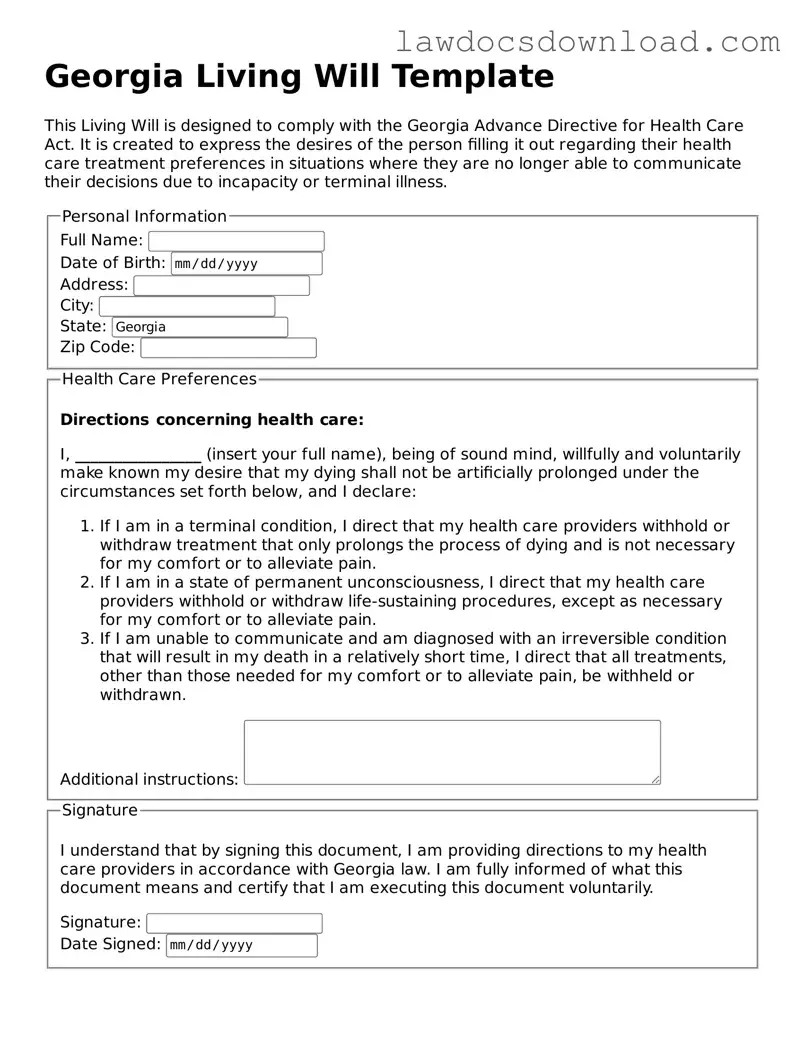The Georgia Living Will form is similar to an Advance Directive for Healthcare. An Advance Directive allows individuals to state their wishes for medical treatment if they are unable to communicate those wishes themselves. Both documents serve the purpose of guiding healthcare professionals and loved ones regarding treatment preferences, but the Advance Directive may also appoint a healthcare agent to make decisions when the individual cannot.
Comparable to a Durable Power of Attorney for Health Care, a Georgia Living Will influences medical decision-making. While a Living Will typically outlines specific wishes regarding life-sustaining treatment, a Durable Power of Attorney for Health Care appoints someone to make a wide range of health-related decisions on behalf of the individual. Both aim to ensure that the individual's healthcare preferences are honored when they cannot articulate them personally.
A Medical Orders for Life-Sustaining Treatment (MOLST) form is another document similar to the Georgia Living Will. This form provides specific instructions about certain life-sustaining treatments based on the patient's current health condition and preferences. Both the MOLST and the Living Will communicate critical decisions about end-of-life care and are designed to be followed by healthcare professionals.
The Do Not Resuscitate (DNR) Order shares common ground with the Georgia Living Will, though it is more narrowly focused. A DNR specifically addresses the use of CPR (cardiopulmonary resuscitation) if an individual's heart stops beating or if they stop breathing. Unlike the broader scope of a Living Will, which covers a variety of life-sustaining treatments, a DNR applies to this singular issue.
A Health Care Proxy is an instrument that, like a Georgia Living Will, involves medical decision-making but through a different approach. It designates another person to make healthcare decisions on behalf of the individual if they become incapable of making those decisions themselves. The Living Will generally advises on specific treatments preferred or declined, whereas a Health Care Proxy appoints someone to interpret and enforce those wishes.
The Five Wishes Document is another comparable document, offering a comprehensive approach to end-of-life planning. It addresses personal, emotional, and spiritual needs in addition to medical wishes and appointing a health care agent, making it broader in scope than a traditional Living Will. However, both serve as critical tools in ensuring an individual’s healthcare preferences are respected and followed.
Lastly, an Organ and Tissue Donation Consent Form, while distinct in its primary focus, shares the essential characteristic of documenting healthcare wishes with the Georgia Living Will. It records an individual's decision regarding organ donation after death. Both documents play significant roles in medical and end-of-life planning, clearly communicating the individual’s healthcare and posthumous wishes to family members and healthcare professionals.

